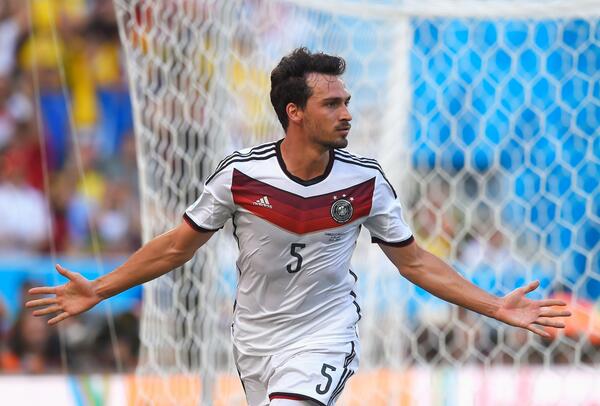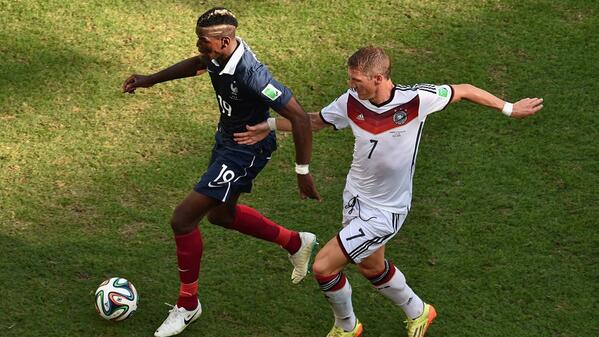
It's a demon buried deep within the French psyche -- a demon which refuses to be exorcized.
A word which brings shivers down the spine and strikes a fear into the heart of the country's football fans.
In Rio de Janeiro, the ghosts of years past haunted France again -- the "Angstgegner" returned.
Germany, the "bogey team" as it is known in France, wrote another painful chapter into Les Bleus' World Cup history on Friday
A 1-0 victory secured Germany's place in the semifinals for a record fourth consecutive tournament.
But unlike in 1982 and
1986, when Germany defeated the French in the last four on both
occasions, this was not a battle of epic proportions.
There was not the drama, nor the controversy -- but the end result was the same.
Mats Hummels' 12th-minute
goal gave Germany a lead it never looked like relinquishing against a
French side which flattered to deceive.
In fact, it was almost an
apologetic exit from Didier Deschamps' players -- so disappointing
after the team's encouraging performances in the group stage.
At a tournament where there have been so many surprises, perhaps it was reassuring that there remains one constant.
Germany, whether it plays to its maximum or just within itself, seems to always get the result it craves.
Joachim Low's side will now face either host nation Brazil or Colombia in Belo Horizonte on Tuesday, while France returns home pondering what might have been.
The tears flowed for those draped in blue -- this was supposed to be the day where France finally gained revenge.
Some 32 years may have passed since the two countries met at the 1982 World Cup, but the painful memories remain.
At the time, France's
World Cup hopes were in the balance with the game at 1-1 when Patrick
Battiston ran on to meet Michel Platini's pass.
Battiston was the
overwhelming favorite to reach the ball first -- and he did so, but as
he approached, West Germany goalkeeper Toni Schumacher laid the
Frenchman out cold with a brutal attack.
Battiston, shorn of
three teeth and suffering damaged vertebrae, left the field on a
stretcher, his limp hand held by a shaken Platini -- who feared his
teammate might have even died.
Schumacher stood tall --
he wasn't red-carded, nor was he even cautioned. Instead, he saved two
penalties in the shootout following a 3-3 draw as West Germany reached
the final, before losing to Italy.
It was an achievement
which preserved his name in notoriety, even securing him top spot in a
poll held by a French newspaper for the most hated German -- a poll he
won ahead of Adolf Hitler.
While the incident may
not register on the German consciousness, it was repeated endlessly on
televisions in the buildup to Friday's contest.
A game with a grudge -- it's hardly a new experience for Germany, which appears to encounter such fixtures on a regular basis.
Its experience at this level is undisputed -- but a failure to win the World Cup in 24 years has not gone unnoticed.
In 2002, Rudi Voller's
team was defeated in the final by Brazil -- since then there have been
three consecutive semifinal defeats.
For so long German
football has been admired, but with success comes expectation and, in
terms of triumphs, "Die Mannschaft" has failed to deliver.
Perhaps this is the year where Low's side finally delivers.
Criticized after a 2-1 extra-time victory over Algeria in the last 16 at Brazil 2014, Germany began brightly against France and made light of the flu virus which had swept through its camp.
Just 12 minutes of the contest had elapsed when Hummels held off Raphael Varane to head home Toni Kroos' perfect delivery.
Given the number of spectacular strikes witnessed at this World Cup, Hummels' effort was remarkable for its simplicity.
France, temporarily
dazed by conceding, began to assert itself with the impressive Mathieu
Valbuena beginning to cause Germany problems.
The diminutive
midfielder, so influential in the group stage as France breezed through
with ease, came close to forging an equalizer with 11 minutes of the
first half remaining.
Antoine Griezmann found
space on the left and his pass allowed Valbuena to curl the ball towards
goal only for Manuel Neuer to save and Karim Benzema to lash wildly at
the rebound.
Benzema, who scored
three times in his opening two games, then went close before the
interval as Hummels blocked the forward's close-range header.
In 10 previous ties where it had trailed at halftime of a World Cup tie, France had lost on each and every occasion.
But this French side has
already overcome the odds. That it qualified for the tournament at all
was somewhat of a surprise given its dreadful performance in the playoff
tie
A 2-0 defeat by Ukraine
in the first leg left Deschamps staring into the abyss -- a misery only
averted by a miraculous 3-0 victory in the return leg four days later.
But a comeback against
Germany, a team renowned for its ruthlessness and ability to dominate
its opponents is a far more difficult proposition.
Deschamps' decision to replace a defensive midfielder in Yohan Cabaye with striker Loic Remy signaled his side's intentions.
His pace, in addition to
the threat posed by Griezmann and Benzema, appeared to trouble a
Germany defense which was never managed to give impression of being
wholly convincing.
But whenever France did
manage to get in behind its opponents, Neuer provided a formidable
presence, denying Blaise Matuidi from close range.
As both teams began to
suffer in the heat, the action moved from end to end, with Germany twice
failing to put the result beyond doubt
Then, with the contest
entering its final throes, Benzema's effort -- from a position where he
would be expected to score -- was palmed away by Neuer in almost
nonchalant fashion.
As the final whistle
blew, heads fell, tears followed and French players were left with an
all too familiar feeling -- the "Angstgegner" had struck again.
source: CNN.COM










0 comments:
Post a Comment